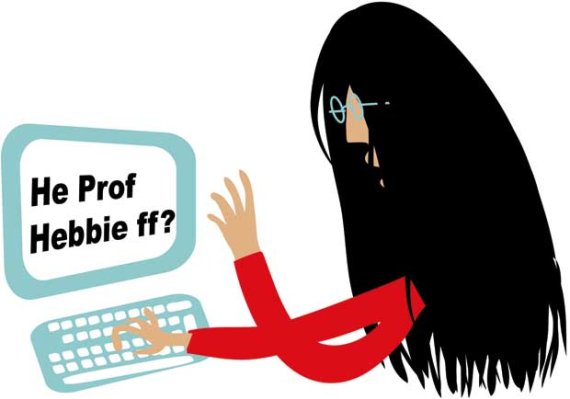Wrong tone Study advisor Alet Leemans gets a lot of them in her inbox: sloppily written emails with unfinished sentences, sometimes impolitely formulated. ‘You will get an email saying only "Hey, when can I come by?" My response is, "Ask me again politely." It may sound fussy but as a study advisor I have a responsibility to provide some guidance too. You cannot send an email like that to a sponsor or a place you are applying to for an internship or a job.’ But most students write polite emails, Leemans adds. Marcel van Oijen, who teaches Animal Sciences at Van Hall Larenstein, also notices that some students see email as a sort of glorified text messaging service. ‘No form of address, no capital letters, no punctuation. The tone is often fairly informal, as if they are chatting to friends rather than addressing their teacher. Letting me know that they think it’s "really shitty" that they didn’t pass an exam.’ But that informality is just what Van Oijen likes. ‘If they address me very formally I feel uncomfortable.’ According to German student Evelyne Lukat, who recently graduated in Environment Sciences, cultural differences play a role too. ‘In Germany I start my emails with "Mr. Prof. Dr.", but I soon realized that wasn’t necessary in Wageningen.’
‘You have 187 new messages’ It has become much easier to contact teachers, and Teacher of the Year 2012 Frits Claassen’s inbox is often bulging with new mail. ‘Emails fly up and down around exams time especially.’ Van Oijen gets a lot of emails from his students too. ‘Certainly in the later stages of their studies, when they are at home less because they are on internships or doing research for their final dissertations.’ He always makes sure he replies to his emails promptly and properly. ‘That is important to me because it is my task as a teacher to coach students and give them feedback.’ And students expect this of their teachers. ‘I don’t accept it when someone can’t even find a minute to reply to me, even if it’s just an "I’m busy, I’ll get back to you as soon as possible."’, says Rimante Rusaite from Lithuania. ‘A fast reply shows that the teacher cares about his students and takes their work seriously.’ Jacqueline Geerts appreciates it if a teacher responds to an email quickly but she doesn’t expect it. ‘I don’t always reply to emails from my teachers straightaway either, so I don’t expect it of them.’
Facebook for education A recent survey at the university showed that 90 percent of the students are on Facebook, and half of them check it several times a day. Frits Claassen is familiar with this. ‘A student will take his smartphone out of his pocket in the middle of a conversation and click on it while he’s talking to you.’ This has just become part of the culture, he thinks. ‘Sometimes I comment on it in a joking way.’ A number of departments and teachers make use of social media for educational purposes. Biology students, for example, can exchange information on a Facebook page, while Forest and Nature Management has a page where interesting topics and conferences are announced. In the Social Psychology department, people no longer communicate by email but via a WhatsApp group (a chat programme for smartphones – ed.) According to Van Oijen Facebook is a useful educational tool. ‘It’s like the Albert Heijn: somewhere you meet everyone every day. I have made a Facebook group for my students where they can leave messages for friends or ask me questions. I am the administrator and I can keep an eye on what goes on.’
Lecturer as BFF? Lecturers Alet Leemans and Van Oijen have a Facebook profile but they keep it for their personal lives. Van Oijen: ‘I am their teacher; I have to assess their work. So you need to preserve a distance. Only after you have graduated can you be my friend.’ Claassen does not have Facebook. ‘I protect myself against that. I do get those invitations but they usually go straight into the bin. Anyone who really wants to find me will find me.’ Most students are no keener on the idea of getting friend requests from their professors. What they get up to after class and at weekends is their business, as far as they are concerned. Laura Martinez Izquierdo: ´I don´t want my parents on Facebook either, let alone my teachers. Facebook is for friends.´ Recent Peruvian graduate Jazmin Gonzales Tobar sees this differently. ‘I have never invited them to be friends on Facebook because I hadn’t built up a long-term relationship. But now I think about it, I am going to do so. My teachers were very friendly and I talked to them as if they were my friends.’

